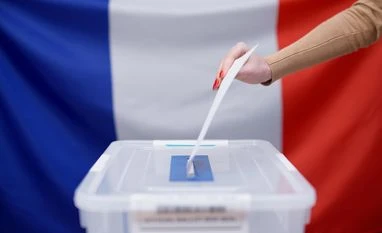French political leaders from the left-wing bloc that came first in Sunday's legislative election said they intended to govern according to their tax-and-spend programme, but centrists laid claim to a role as the left lacks a majority.
The unexpected outcome of the snap election has plunged France into uncertainty just before the Paris Olympics, with no obvious path to a stable government capable of getting any legislation passed by a fragmented parliament.
The left-wing New Popular Front (NFP) won the most seats in the National Assembly but fell short of an absolute majority by about 100 seats. President Emmanuel Macron's centrists came second and the far-right National Rally (RN) third.
"The path to government is very narrow, very fragile," said Fabien Roussel, leader of the Communist Party which is one of the smaller members of the NFP.
"But we have to try. The president of the republic has to let us govern," he said on RTL radio on Tuesday morning.
NFP leaders have met behind closed doors several times since Sunday night, attempting to thrash out an agreement on which of them should be prime minister and how they should approach governing without a majority.
Also Read
France seemed likely to endure a period of protracted haggling, at a time when investors are worried about the county's strained public finances.
Macron, whose term ends in 2027, looks unlikely to be able to drive policy again, having been beaten by the far-right RN in last month's European election and by the left in the snap legislative election he called against the will of some of his own supporters including Prime Minister Gabriel Attal.
Jean-Luc Melenchon, leader of the hard-left France Unbowed, said an NFP government should fully implement its programme, which includes raising the minimum wage, lowering the retirement age and capping the prices of fuel, power and some food staples.
The policy programme "cannot be sliced into pieces", he said on TF1 television late on Monday, rejecting the idea of a coalition with parties from outside the NFP.
MUTUAL OVERTURES
Others within the NFP sounded more ready to compromise.
"We are going to have to reach out to others," said Roussel.
Centrists pointed out that the NFP was too far short of a majority to govern alone and implied that the alliance should break up so that its more moderate elements could form a broader coalition, excluding the divisive Melenchon and France Unbowed.
Yael Braun-Pivet, a lawmaker from Macron's Renaissance party and the outgoing speaker of the National Assembly, called for centre-left, ecologist, centrist and centre-right parties to agree on a 12- to 18-month programme for government including measures on which they could find consensus.
"I'm holding my hand out," she said on France Inter radio.
But such overtures from centrists were being rebuffed by NFP members who rejected the idea of breaking up their alliance.
Some on the left countered the centrist proposals by offering the opposite solution: that the centrist bloc should break up and some of them should support the NFP.
"To speak plainly, I'm thinking about left-leaning Macronists who might be open to joining us. We'd be open to that," said Johanna Rolland, the Socialist mayor of Nantes, on France 2 television.
WHO WILL BE PM?
In the absence of clarity on when a new government could be formed, Macron asked Attal on Monday to stay on as prime minister for the time being, to provide stability.
Within the NFP camp, there appeared to be no consensus on who should replace Attal.
Melenchon and his France Unbowed allies were all saying it should be someone from their party, the biggest in the NFP.
Asked on TF1 whether he wanted the job, Melenchon did not rule himself out but said it did not have to be him.
"We at France Unbowed have several candidates to put forward," he said, naming his close allies Bompard, Mathilde Panot and Clemence Guette.
But NFP leaders from other parties have said Melenchon was too divisive, and have not conceded that the head of government should definitely be someone from France Unbowed.
"Jean-Luc Melenchon is not the one who will lead an NFP government," said Rolland.
Several names have been circulating in French media.
The most frequently cited since the election have been Socialist leader Olivier Faure, Raphael Glucksmann, who led France's left-wing ticket in the European elections, and Green leader Marine Tondelier.
)